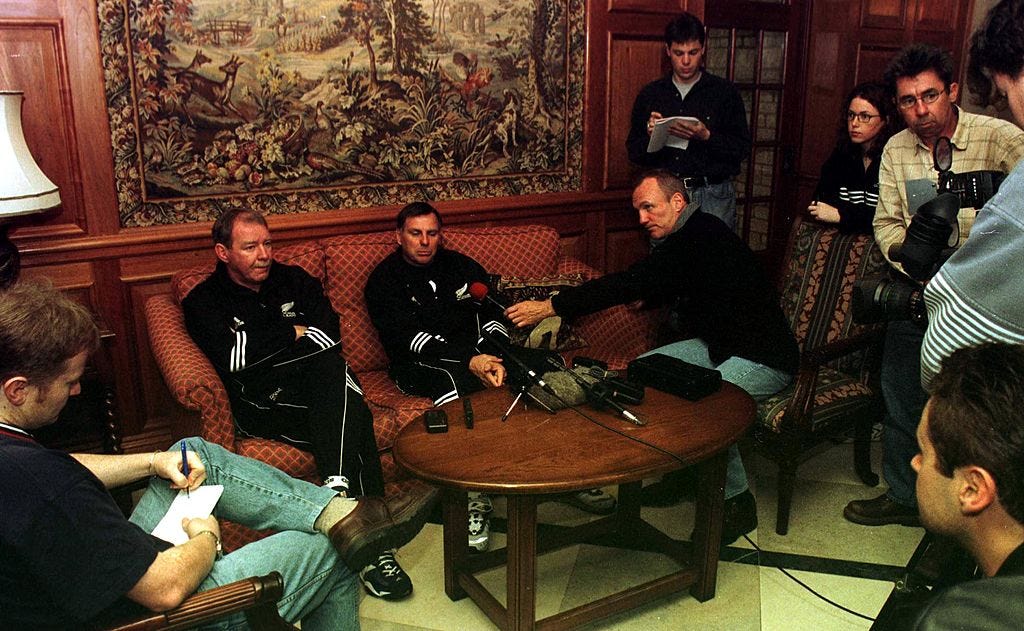
I can’t recall the first time I met Jim, but there’s a good chance I would have heard him before I saw him. When I first started covering the All Blacks semi-regularly, there were a lot more journalists on the rugby beat and there was a hierarchy. There were two main newspaper groups: Independent News and Media (which would later become APN and then NZME) that owned the New Zealand Herald, and INL (which would become Fairfax and then Stuff) that owned mastheads like the Dominion, the Evening Post and the Press.
Wynne Gray was Herald and despite his diminutive stature, he was the silverback. Kayes was Dominion and while he might chafe at the portrayal, he was the blackback starting to carve out his own realm of influence.
Both had cut their teeth on news desks and brought a harder edge to their reportage than traditional ‘sports journalists’. Rugby was well served for the competition.
Kayes surprised a lot of us when he scraped the ink from under his nails, started using moisturiser and crossed that Rubicon into television. It was while working for TV3 that he was subject of one of Steve Hansen’s withering one-liners. Neither men were noted for capitulating in the face of a debate, and as they were finishing exchanging pleasantries, Hansen turned on his heel and left with a, “For fuck’s sake Jimmy, you have been on TV for five fucking minutes and you think your shit doesn’t stink.”
Even Jim will concede it wasn’t a bad line.
I was only rarely a rugby ‘tourist’, but when I did Jim was always a focal point for coffees and chat and, once a week, a couple of beers (Jim was a noted public bar ‘lightweight’ and one of his colleagues once brought him back a saucer of milk rather than a pint). I enjoyed his company back then and still do to this day, though our paths only infrequently cross. Yes, he can lack diplomacy at times but Jim is also fiercely loyal, a staunch defender of the media’s role in the national sport and doesn’t hold grudges.
He’s carved out a hell of a career across the media, particularly rugby media, including producing The Breakdown and editing New Zealand Rugby World, which sadly will stop production after this latest edition.
Here, he writes about his naivety when covering his first World Cup in 1999, and what he learned after covering six of them. - Dylan Cleaver
Mum called to check if I was all right.
It was a few days after the All Blacks had lost to France in the 1999 World Cup semifinal and we had moved from London to Cardiff for the playoff against South Africa for third.
The All Blacks lost that one too, finishing fourth, their worst effort in four tournaments.
“Are you okay,” Mum asked down the long-distance line.
I was young and being paid to follow the All Blacks as part of the travelling press pack. Life was great.
“Sure am,” I replied with some bemusement. “Why? What’s up?”
Today, I wouldn’t have needed to ask because social media would have told me, but back then the internet, in New Zealand at least, was a crude tool, and the iPhone was eight years away. It seems incredible to think it, but those of us on the ground at the World Cup were largely oblivious to the fallout at home.
Or, as Mum put it, “the sky was falling”.
Keep reading with a 7-day free trial
Subscribe to The Bounce to keep reading this post and get 7 days of free access to the full post archives.



